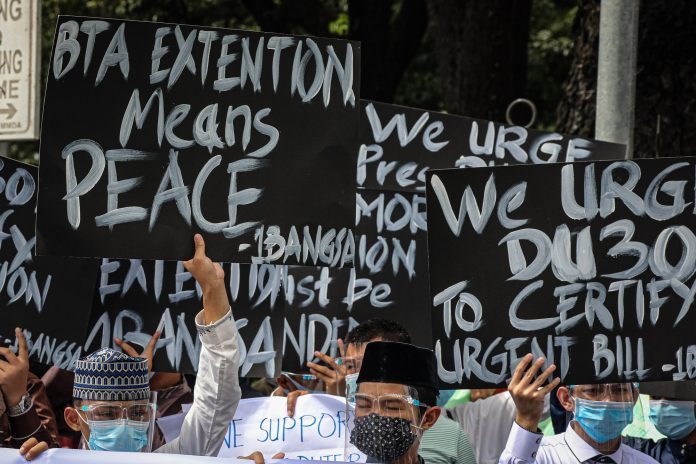President Rodrigo Duterte has signed a law postponing elections in the Bangsamoro Autonomous Region in Muslim Mindanao.
The election is a key provision in a 2014 peace agreement aimed at ending a conflict estimated to have claimed 150,000 lives and is due to take place next May.
But former rebels from the Moro Islamic Liberation Front (MILF) appointed to lead a transitional government have said they needed more time before elections to a local legislature can go ahead and the vote will instead be held in 2025.
“President Rodrigo Roa Duterte signed… (the bill) yesterday resetting the elections in the Bangsamoro Autonomous Region in Muslim Mindanao to 2025,” presidential spokesman Harry Roque told reporters.
The law grants Duterte the authority to appoint members of the 80-member transition authority whose terms would end with the 2025 election, Roque said.
Former MILF rebels have warned that the failure of the peace process would likely draw disillusioned Muslim youths in the region towards the more hardline Islamists still waging an armed campaign in the southern Philippines.
But restrictions imposed because of the pandemic and the transitional government’s inability to draw up an election code had left them with little choice but to delay the poll, Georgi Engelbrecht, senior analyst for the Brussels-based peace monitor International Crisis Group, told AFP last month.
“The extension is not the most perfect solution but nonetheless it’s a start,” he said.
A report by the monitor warned in April that the process of decommissioning the MILF’s 40,000 fighters was “sputtering,” with fewer than a third having laid down their weapons.
And the Duterte government “has been slow to distribute to them the economic packages meant to entice them to cooperate,” it added.
Violence has also persisted despite the peace deal, with radical Islamic groups setting up shop in what remains the poorest part of the country.
In May 2017, hundreds of pro-Islamic State foreign and local gunmen seized Marawi, the country’s largest Muslim city.
The Philippine military wrested back the ruined city after a five-month battle that claimed more than a thousand lives.
An insurgency first emerged in the mainly Catholic Asian nation in the early 1970s as a bid to set up a separate Muslim state in the Mindanao region, though the rebels later scaled down their goals to autonomy.
An earlier peace treaty between Manila and a rival Muslim rebel faction had created a self-ruled area in 1996, but it was hampered by a lack of funding and corruption while the MILF fought on.
The new entity is better-funded and slightly larger. The national government retains police powers.









